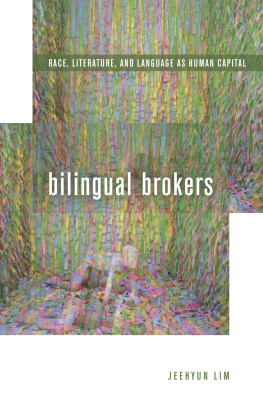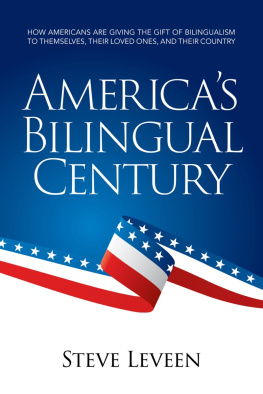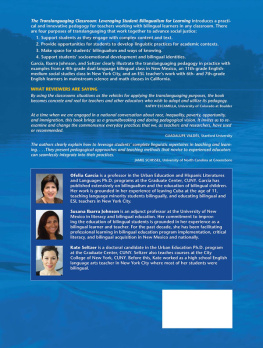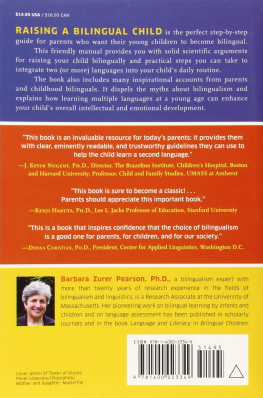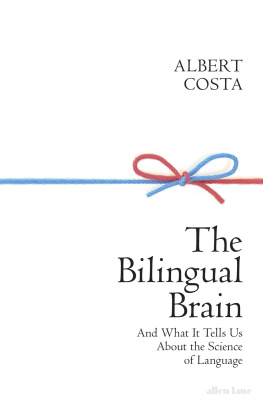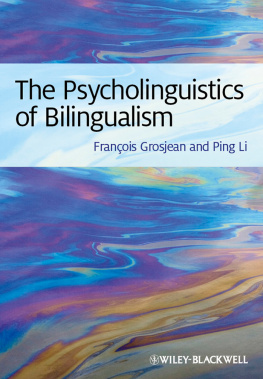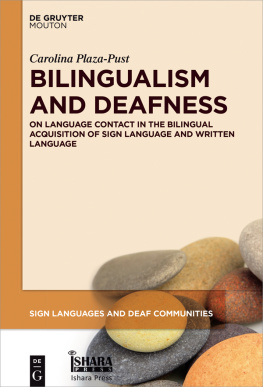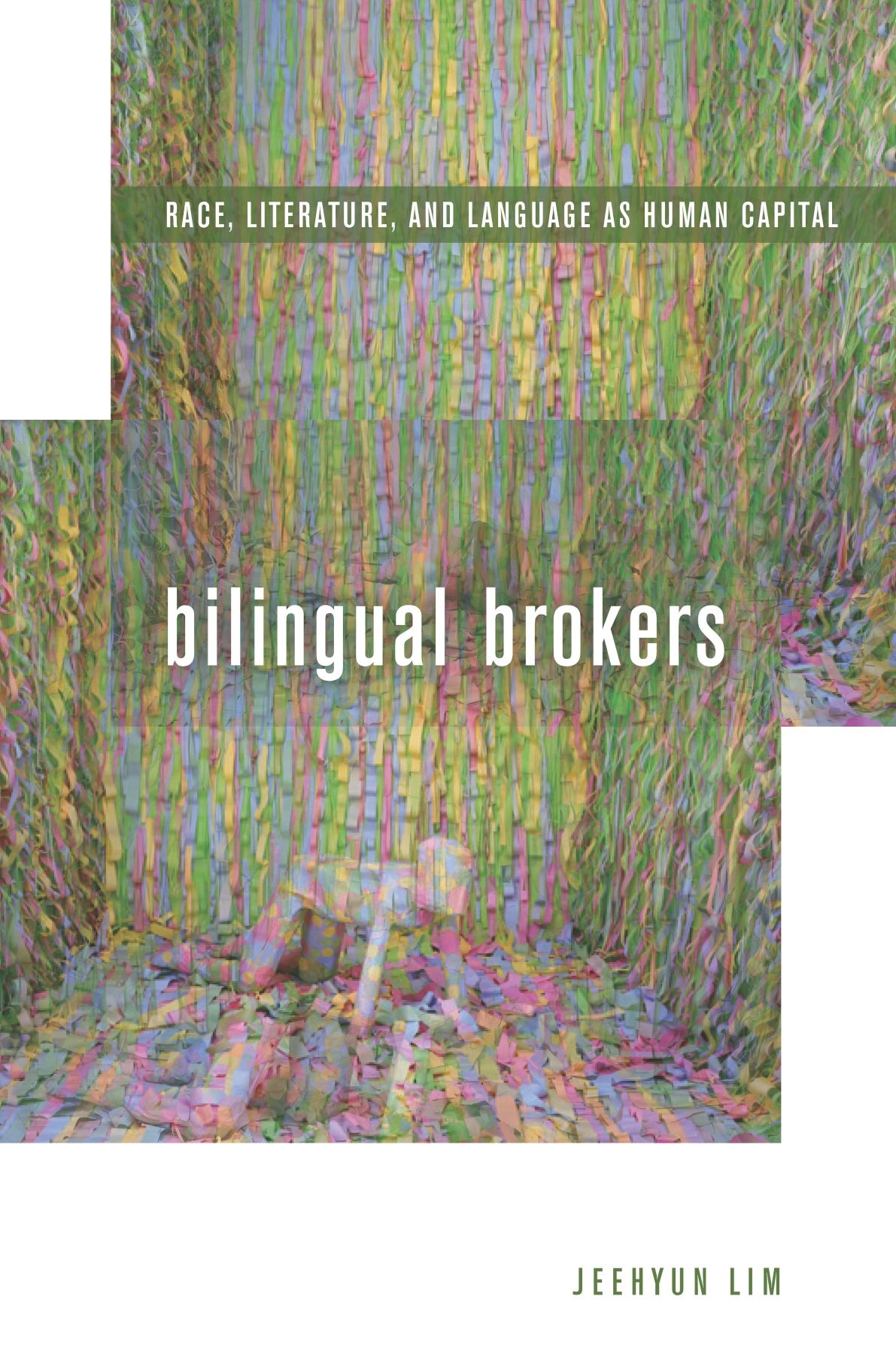Bilingual Brokers
RACE, LITERATURE, AND LANGUAGE AS HUMAN CAPITAL
Jeehyun Lim
FORDHAM UNIVERSITY PRESS New York 2017

THIS BOOK IS MADE POSSIBLE BY A COLLABORATIVE GRANT FROM THE ANDREW W. MELLON FOUNDATION.
Copyright 2017 Fordham University Press
All rights reserved. No part of this publication may be reproduced, stored in a retrieval system, or transmitted in any form or by any meanselectronic, mechanical, photocopy, recording, or any otherexcept for brief quotations in printed reviews, without the prior permission of the publisher.
Fordham University Press has no responsibility for the persistence or accuracy of URLs for external or third-party Internet websites referred to in this publication and does not guarantee that any content on such websites is, or will remain, accurate or appropriate.
Fordham University Press also publishes its books in a variety of electronic formats. Some content that appears in print may not be available in electronic books.
Visit us online at www.fordhampress.com.
Library of Congress Cataloging-in-Publication Data available online at http://catalog.loc.gov.
First edition
for my mother, Young-hye Sung
Contents
Bilingual Personhood and the Cultural Politics of Asian American and Latino Literature
What do you call someone who speaks three languages? A trilingual. What do you call someone who speaks two languages? A bilingual. What do you call someone who speaks one language? An American. This common joke actually contains several observations about what the sociologist Pierre Bourdieu might call the linguistic habitus of the United States. First, the punch line of the joke assumes that the dominant culture in the United States is monolingual. Less obvious but also embedded in the joke is the definition of an American. This joke, for example, would not apply to a Spanish-speaking Latino in New York City or a Cantonese-speaking Chinese American in San Francisco. At the same time that it pokes fun at the seeming lack of interest among Americans in learning languages, the joke in the same breath excludes bilingual Americans from normative Americanness. From an academic standpoint, what the longtime scholar of bilingualism Franois Grosjean says about the changes to the linguistic habitus of the United States helps one to further reflect on the contingent humor of the joke. In one of his recent studies on bilingualism, the psycholinguist compares the lingual culture of contemporary United States to that of the 1970s when he was working on his seminal study of the bilingual experience, Life with Two Languages. While the numbers are still small compared to European countries, Grosjean suggests that his initial assessment of the United States as a monolingual country may not be so valid any more.
If one still hears a ring of truth in the joke despite Grosjeans recent findings about the changes to US lingual culture, this probably speaks to how new the recognition of bilingualism as a socially significant phenomenon is in the United States. In the same study, Grosjean also details which non-English languages have the largest numbers of speakers. Unsurprisingly, Spanish tops the list. But Grosjean also notes that several Asian languages (Chinese, Tagalog, Korean, Vietnamese) are on the list of the top ten non-English languages.
The premise of this study is that the growth of Asian American and Latino communities since 1965 is the driving force behind the steady shift in US linguistic habitus away from monolingualism. In light of this shift, I turn to writings by Asian Americans and Latinos to trace how the social changes accompanying the new bilingualism affect cultural representations of language difference and how, vice versa, cultural representations engage with the social lives of language minorities. Throughout the study, I seek to construct a dialogic relationship between the social significance of bilingualism and its cultural ramifications. The focus of this study, then, is not just to trace the role that Asian American and Latino writers play in conceptualizing and illustrating the cultural consequences to the changes in Americas linguistic habitus but, more importantly, to examine literature as the site where insights on the social construction of bilingual personhoodhow bilingual persons are produced and reproduced within a set of social habits, relations, and practices of languagecan be gleaned and from which the cultural ramifications of this personhood can be noted and discussed.
A similar assumption of monolingualism that informs the joke in the beginning of this introduction has also informed much of the study of US literature. In the past twenty years or so, however, that assumption has been challenged by studies that variously call for a recognition of and engagement with the multilingual origins of US literature or draw attention to the aesthetic qualities of bilingualism.has an avowed interest in examining when, why, and how bilingualism becomes symbolic value. This investment, I hope, imbues this study with a self-reflectiveness about the constraints of valorizing bilingualism in academia, which is already favorably inclined toward multilingualism because its encounters with language difference are usually of the kind where the symbolic value of such difference is taken for granted. My hope is that a focused look at the contingencies of value for bilingualism will contribute to making the recent critical interest in bi/multilingualism in US academe into not just another repetition of the academic mantra that familiarity and facility with more than one language is valuable but into a more sustained look at the social and cultural meanings of language difference.
The Two Faces of Bilingualism
The cultural politics of bilingualism that manifested itself nationally during the time of the English Only movement is a culmination of a larger set of concerns about American identity amid the growth of minority voices and presence. In Bilingual Brokers I am interested in how language difference becomes crucial for negotiating American identity in Asian American and Latino writings, especially as it intersects with racial difference. Language difference becomes something of an index by which the selective social incorporation of racialized difference can be recognized as bilinguals who can present their linguistic capabilities as assets are valorized as human capital, while bilinguals whose language difference is considered a liability are castigated as undesirable aliens. This seemingly contradictory coexistence of two very different assessments of bilingualism actually is at the heart of the complex dynamic of racialization after the end of legal racism.
Two contrasting attitudes on the value of bilingualism among Spanish-speaking Puerto Rican Americans that were discussed during the height of English Only in the 1990s encapsulate the duality of bilingualism I mention above. On the one hand, un hombre que hablo dos idiomas vale por dos (a man who speaks two languages is worth two men). These two very different evaluations of bilingualism are reiterated in Asian American and Latino literature to express a structure of feeling borne out of a complex nexus of race, language, and minority subjectivity, a nexus that I suggest is crucial to understanding postWorld War II racialization.

